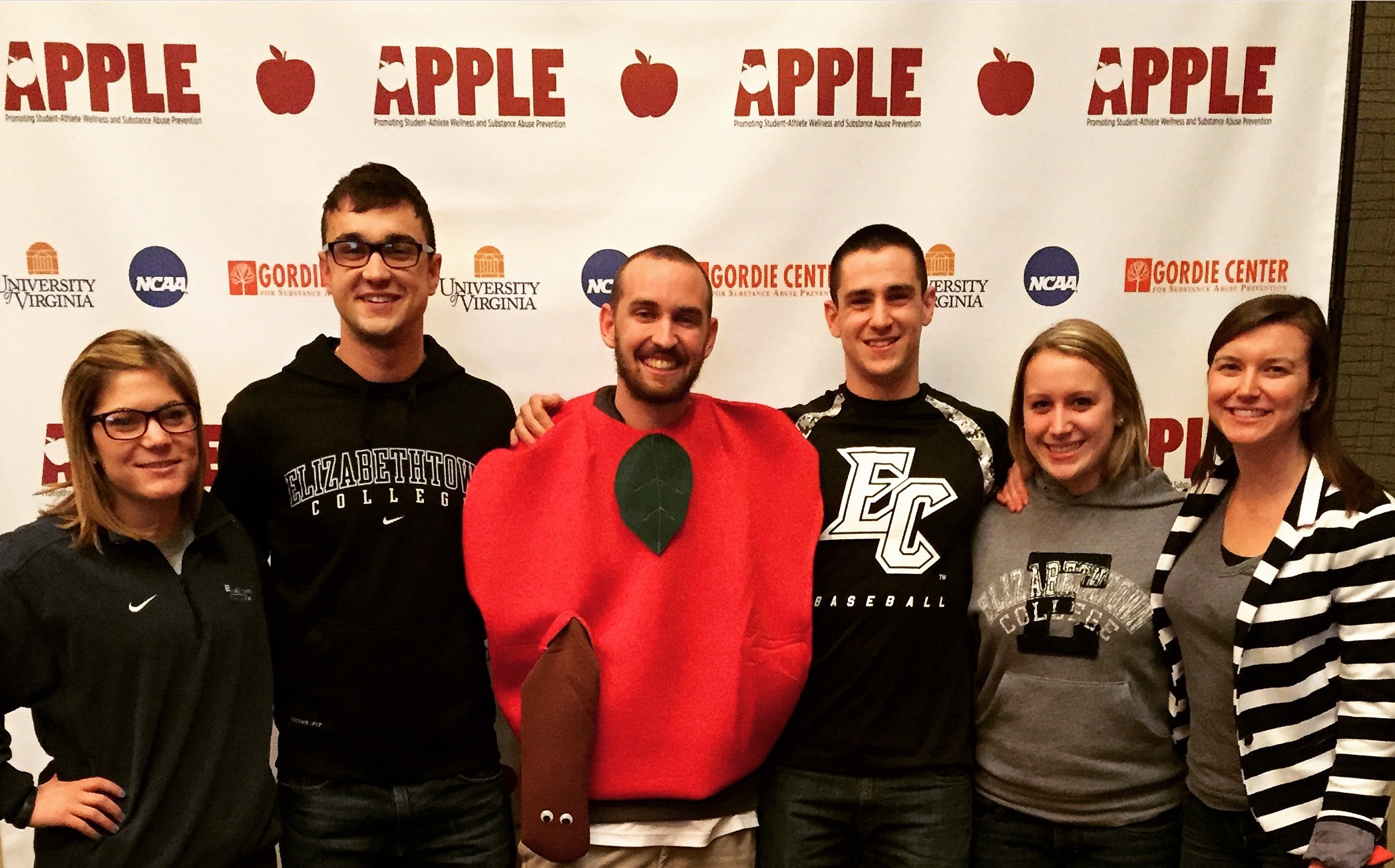Ashley Dispenziere, Nicholas Gulla, Stephanie High and Zachary Tomasko joined students from NCAA-member schools all over the country to educate themselves about the problems facing student athletes, including alcohol and substance abuse and the stigma surrounding mental health. The NCAA APPLE Conference, or Athletic Prevention Program and Leadership Education, held in mid-January in Reston, Virginia, was originated by the Gordie Center for Substance Abuse Prevention at the University of Virginia and has educated 1,100 teams from more than 500 NCAA member schools since its creation in 1992.
The symposium, attended by the four Elizabethtown College students and two administrative representatives, aims to aid colleges in their promotion of student athlete wellness by helping students identify their school’s current systems and policies, assisting them in the creation of a personalized action plan and encouraging them to implement the new plans by offering assistance for at least a year.
Amanda Cheetham, health educator from the College’s Office of Student Wellness, who attended with the students, explained that it is essential for student athletes to receive this education because they will, at some point in their college career, be exposed to drugs and alcohol, whether directly or indirectly. If students are going to be exposed, she added, they need to be educated.
“I went to a session where we watched the movie ‘Haze’,” said High, a junior business administration major. The movie centers on a beloved star athlete who dies in his first month of college due to fraternity hazing. “A movie like that shows us how much education is important,” High said. “Like, not just saying ‘Don’t drink,’ but maybe teaching people how to drink in a way that won’t kill them. And students all over the country are uneducated. It’s not just us. It’s all over the country.”
Jonathan Hoynak, an assistant athletic trainer at Elizabethtown and an administrative representative at the symposium, agreed, pointing out that student athletes should not only be taught alcohol abstinence but ways to drink responsibly, if they choose to do so once they turn 21.
I think the students felt empowered that they could be part of that change. . .”
It is the hope of the symposium and Cheetham that students will hear this call to action and bring about change in their institutions rather than wait for formal rulings by college administration. “If students are energized and getting excited about what they can do to help the situation, there will be lasting change,” Cheetham said. “I think the students felt empowered that they could be part of that change. And that’s energizing to me.”
Each attendee was greatly impacted by something they heard or saw at the conference. Gulla, a junior biology major, enjoyed the opportunity to work with students from schools all over the country. High discovered the importance of educating student athletes to things beyond the standard drug and alcohol resistance policies such as the effect a cup of coffee can have on a drug test. Tomasko, a junior business administration major, said he was especially impressed by the keynote address by Ross Szabo, which discussed how a student athlete’s mental health affects his or her life and athletic performance. A greater stigma exists about student athlete mental health than for others, which can, in turn, lead to greater alcohol and substance abuse.
Though the main purpose of the conference was to analyze the College’s current policies and begin to make plans to update them, Dispenziere, a junior early childhood education major, said the conference will even affect her life after college. “I think a lot of us want to become coaches eventually, so this is important stuff to know.”
For Cheetham, who deals with these topics on a daily basis, the biggest prize was to sit and listen to the students discuss their concerns about the current system and formulate ideas concepts for the new plan.
“We have some ideas, and we’re going to start looking at the different policies of different teams on campus,” Tomasko said. “We want to get everybody’s thoughts,” Gulla added.
One of the things that struck all the attendees was that, with help from a NCAA grant, they were given the opportunity to attend. “With E-town allowing us to participate in the conference, it shows that the athletic department is invested in the future of its student athletes, along with making campus a safer place for all students,” Gulla said,
The group plans to meet throughout the semester to continue the work until the next APPLE Conference.


